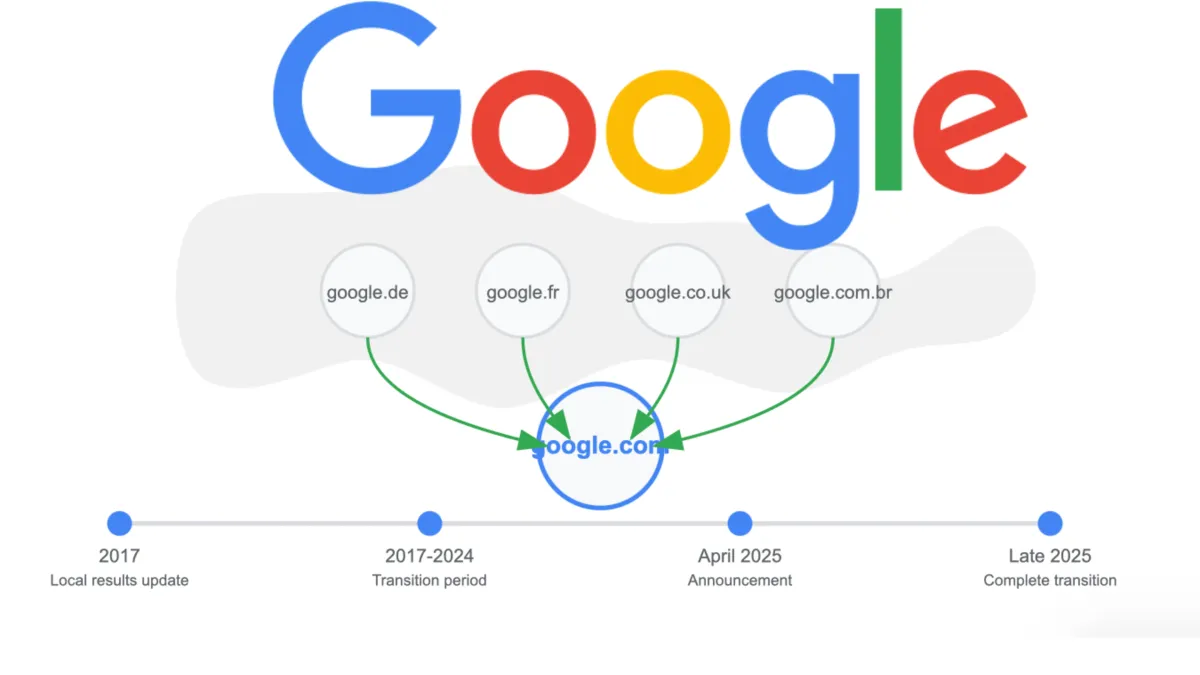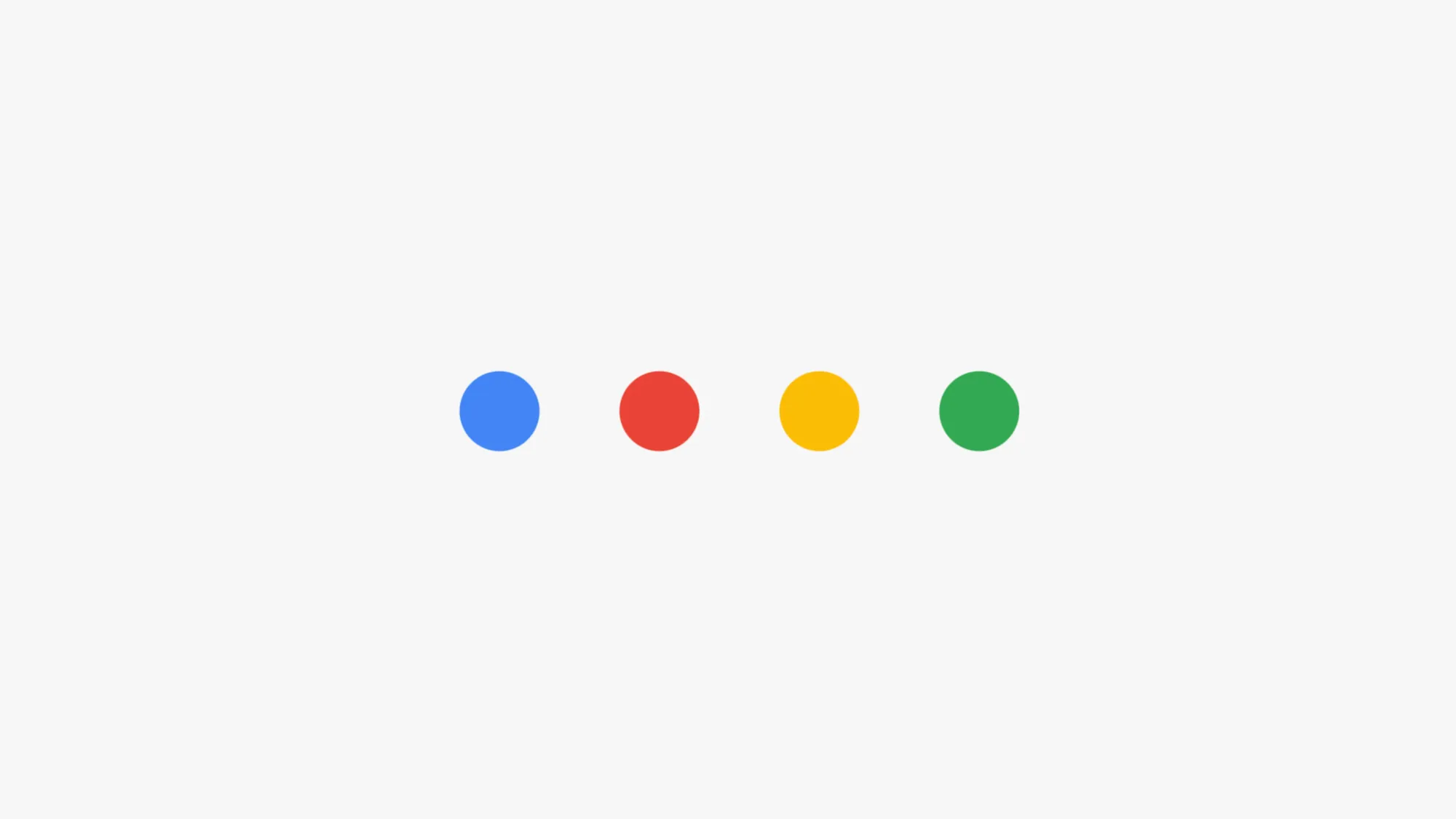
Google announced on April 15, 2025 it will begin phasing out its country code top-level domains (ccTLDs) in the coming months, redirecting all traffic to google.com. This significant infrastructure change impacts hundreds of country-specific domains such as google.ng (Nigeria), google.com.br (Brazil), and google.co.uk (United Kingdom).
According to Google's official announcement: "Because of this improvement, country-level domains are no longer necessary. So we'll begin redirecting traffic from these ccTLDs to google.com to streamline people's experience on Search."
The change follows Google's 2017 update that standardized how the search engine delivers local results. Since that change implemented nearly eight years ago, Google has been providing localized search results based on user location rather than the specific domain being accessed.
"When you're searching on Google, we aim to provide the most useful information, and many times that includes providing locally relevant search results," Google explained in its announcement.
The announcement has generated significant discussion within the search engine optimization (SEO) community, with professionals debating the potential impacts on international SEO strategies.
John Mueller, Senior Search Analyst and Search Relations team lead at Google, confirmed on social media that this change does not affect how international SEO works. "Nothing has changed with regards to international SEO," Mueller stated in response to concerns from industry professionals.
Kurt Peterson, an SEO professional, highlighted on LinkedIn that this represents an interesting development as several clients are "actively re-platforming with ccTLDs and generic .com TLDs in mind." He also noted that "Google is even sunsetting their own ccTLDs to their .com."
The discussion has raised questions about user preferences in certain markets. Peterson observed that "while I love the simplicity and scalability for hreflang & content-language signals that comes with a single .com strategy, we've seen certain countries where users have a strong preference for their ccTLDs like Germany, China, and the UK."
Marcus Pentzek, an SEO specialist for the Chinese market, provided data suggesting that between 2020 and 2024, Chinese .cn domains saw an increase in usage. "While still .com are the way more common ranking domains, the .cn are there," Pentzek noted.
This change comes at a time when some website owners are reporting issues with 301 redirects after Google's recent updates. A user named Scarlett shared on Mastodon that she had "redirected my website to a new domain using a 301 redirect — something I've done at least twice a year without any issues. Everything used to work smoothly. However, the 301 redirect I implemented about a month ago is not performing as expected. The new domain is not ranking at all."
John Mueller responded that while "nothing has fundamentally changed," it's essential to remember that "redirects are just one part that goes into canonicalization, it's good to be consistent with all the signals, including all internal links." He added that "just redirecting and leaving everything else alone isn't always going to be convincing to Google's systems."
This context is particularly relevant for site owners who may be implementing domain changes or consolidations in response to Google's announcement.
The roots of this current change date back to October 2017, when Google first updated how it managed local search results. At that time, Evelyn Kao, a Product Manager at Google, explained: "Today, we've updated the way we label country services on the mobile web, the Google app for iOS, and desktop Search and Maps. Now the choice of country service will no longer be indicated by domain."
That 2017 update meant that users would automatically receive the country service corresponding to their location, regardless of which Google domain they visited. For example, a user in Australia would receive Australian search results even if they typed google.com into their browser.
The 2025 announcement completes this transition by eliminating the need to maintain separate country-specific domains entirely, instead redirecting all users to google.com while still providing localized results based on the user's location.
Want to reach marketing professionals and decision-makers? Showcase your brand, tools, or services with our sponsored content opportunities.
Some industry observers have speculated about Google's motivations for the change. James Patterson suggested on LinkedIn that the ccTLDs might have been "in disparate systems, making it more challenging (translated expensive) for Google to push AI and Paid Search updates," noting that "historically those ccTLDs were always late to the party on Google updates."
Kurt Peterson agreed with this assessment, suggesting that "it will certainly simplify the management of their tech stacks and all the connected APIs they have to all their other products. So it's gotta be a cost saver."
Saumil Shah was more direct, stating that "Google is just doing cost cutting by shutting down ccTLDs."
For most users, the change should be largely invisible beyond seeing google.com in their browser address bar instead of their country-specific domain. Google has emphasized that the update "won't affect the way Search works, nor will it change how we handle obligations under national laws."
However, Google did note that users "may be prompted to re-enter some of your Search preferences in the process" as the change rolls out gradually over the coming months.
The change aligns with how Google already manages services across many of its other platforms, including YouTube, Blogger, Google Earth, and Gmail, which do not use country-specific domains to deliver localized experiences.
For digital marketers and SEO professionals, this change reinforces the importance of proper international SEO implementation that doesn't rely solely on ccTLDs. Best practices now more clearly favor:
- Proper hreflang implementation for language targeting
- Consistent content-language signals
- Location-specific content rather than domain-specific strategies
- Unified domain strategies with proper geotargeting in Google Search Console
Thomas Rosenstand, Director of SEO at Vaekst Digital, confirmed that Google's statement "is solely concerning their own sites," suggesting that while Google is consolidating its own domain structure, this doesn't necessarily mean website owners should follow suit for their international targeting strategies.
This change comes during a period of significant evolution in Google's services, including the recent announcement of Google Discover expanding to desktop, which could generate an estimated 10-15% additional traffic for publishers.
Timeline of Google's domain strategy evolution
- October 27, 2017: Google updates how it labels country services, making search results based on user location rather than domain accessed
- 2017-2024: Google maintains country-specific domains while delivering localized results based on user location
- April 15, 2025: Google announces plan to sunset all country-specific domains
- April-June 2025: Gradual rollout of redirects from ccTLDs to google.com begins
- Late 2025: Expected completion of transition (based on "coming months" timeframe)


